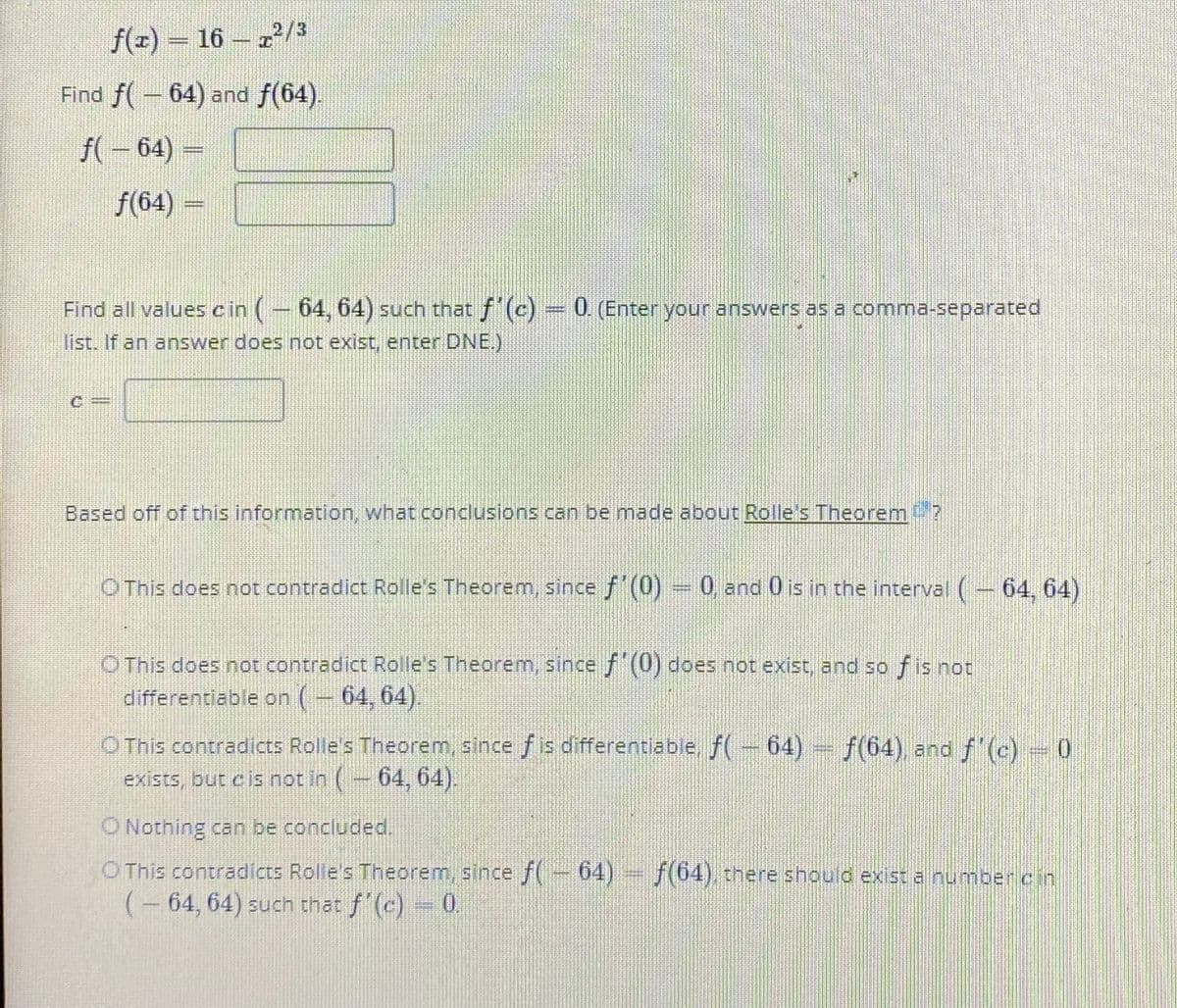f(z) = 16 – z/3 Find f(– 64) and f(64). f(– 64) = %3D f(64) Find all values cin (-64, 64) such that f'(c) = 0. (Enter your answers as a comma-separated list. If an answer does not exist, enter DNE.) C = Based off of this information, what conclusions can be made about Rolle's Theorem? O This does not contradict Rolle's Theorem, sincef (0) = 0, and 0 is in the interval (- 64, 64) O This does not contradict Rolle's Theorem, since f (0) does not exist, and so f is not differentiable on (- 64, 64). O This contradicts Rolle's Theorem, since f is differentiable, f(-64) = f(64), and f'(c) 0 exists, but c is not in (-64, 64). O Nothing can be concluded. O This contradicts Rolle's Theorem, since f(- 64) f(64) there should exist a number cin (- 64, 64) such that f'(c) 0.
f(z) = 16 – z/3 Find f(– 64) and f(64). f(– 64) = %3D f(64) Find all values cin (-64, 64) such that f'(c) = 0. (Enter your answers as a comma-separated list. If an answer does not exist, enter DNE.) C = Based off of this information, what conclusions can be made about Rolle's Theorem? O This does not contradict Rolle's Theorem, sincef (0) = 0, and 0 is in the interval (- 64, 64) O This does not contradict Rolle's Theorem, since f (0) does not exist, and so f is not differentiable on (- 64, 64). O This contradicts Rolle's Theorem, since f is differentiable, f(-64) = f(64), and f'(c) 0 exists, but c is not in (-64, 64). O Nothing can be concluded. O This contradicts Rolle's Theorem, since f(- 64) f(64) there should exist a number cin (- 64, 64) such that f'(c) 0.
Elements Of Modern Algebra
8th Edition
ISBN:9781285463230
Author:Gilbert, Linda, Jimmie
Publisher:Gilbert, Linda, Jimmie
Chapter8: Polynomials
Section8.5: Solution Of Cubic And Quartic Equations By Formulas (optional)
Problem 32E
Related questions
Question

Transcribed Image Text:f(x) = 16 – 2/3
Find f(- 64) and f(64).
f(– 64)
f(64) =
Find all values cin (-64, 64) such that f (c) 0 (Enteryour answers as a comma-separated
list. If an answer does not exist, enter DNE.)
Based off of this information, what condlusions can be made about Rolle's Theorem ?
OThis does not contradict Rolle's Theorem, since f (0) 0, and 0 is in the interval (-64, 64)
O This does not contradict Rolles Theorem, since f (0) does not exist, and so fis not
differentiable on (-64, 64).
O This contradicts Rolle's Theorem, since f is differentiable, f(- 64) f(64), and f'(c) 0
exists, but cis not in (-64, 64).
O Nothing can be concluded.
O This contradicts Rolle's Theorem, since f(-64) f(64) there should exist a nurmber cin
(- 64, 64) such that f'(c) 0.
Expert Solution
This question has been solved!
Explore an expertly crafted, step-by-step solution for a thorough understanding of key concepts.
This is a popular solution!
Trending now
This is a popular solution!
Step by step
Solved in 3 steps with 3 images

Knowledge Booster
Learn more about
Need a deep-dive on the concept behind this application? Look no further. Learn more about this topic, calculus and related others by exploring similar questions and additional content below.Recommended textbooks for you

Elements Of Modern Algebra
Algebra
ISBN:
9781285463230
Author:
Gilbert, Linda, Jimmie
Publisher:
Cengage Learning,

Algebra & Trigonometry with Analytic Geometry
Algebra
ISBN:
9781133382119
Author:
Swokowski
Publisher:
Cengage

Linear Algebra: A Modern Introduction
Algebra
ISBN:
9781285463247
Author:
David Poole
Publisher:
Cengage Learning

Elements Of Modern Algebra
Algebra
ISBN:
9781285463230
Author:
Gilbert, Linda, Jimmie
Publisher:
Cengage Learning,

Algebra & Trigonometry with Analytic Geometry
Algebra
ISBN:
9781133382119
Author:
Swokowski
Publisher:
Cengage

Linear Algebra: A Modern Introduction
Algebra
ISBN:
9781285463247
Author:
David Poole
Publisher:
Cengage Learning